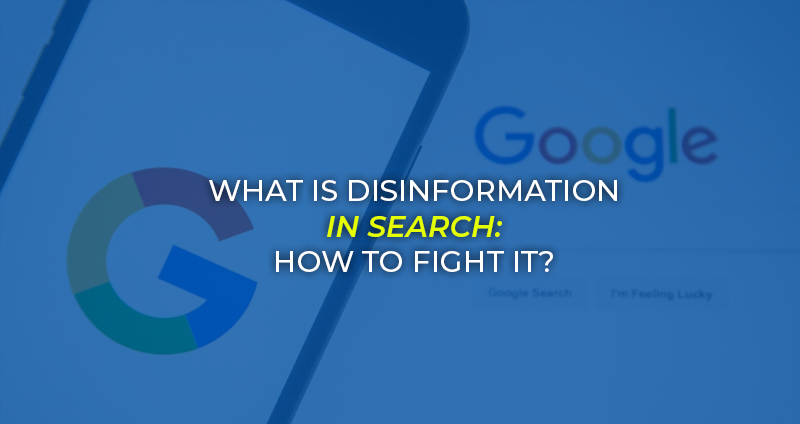Ever heard about terms like ‘misinformation’ or ‘disinformation’ in search? But whether you believe it or not, these terms do exist, and SEO professionals spend a vital part of their day fighting them. So, where do we start?
Let’s start with being human. As the smartest creatures on the planet, we are filled with curiosity that takes to different places in search of answers.
With schools, colleges, and libraries are closed or operating by appointments; we are doing what we can do; we are asking Google.
But can we trust Google?
As SEO professionals, we have the eye for details, and that’s why our clients pay us. Nowadays, it has become more important than ever to pay attention to the way how Google represents you.
Why? Because silly things happen. Things take a complicated turn when misrepresentation contorts to silly to intentional deception? That’s exactly what we are going to explain through this post. But right before that-
What is disinformation?
In simple words, disinformation is false or misleading information that is spread deliberately to deceive users. The information spread is false with an objective to harm an individual, a social group, or a country.
Another interesting thing- disinformation has a sister- mal-information.
Mal-information uses information-based, in reality, to inflict the harm.
In yesteryears, Google identified and addressed the grandeur of government-backed phishing.
Smaller but equally threatening, they attempted to alter the Google Map so people cannot find their polling stations. Right now, The SERPs themselves are in the never-ending battle.
Manipulation, disinformation, and search engine?
You mean they are connected with each other? Yes, directly and indirectly. There are many SEO-savvy propagandists who can easily spread disinformation on the platform as well as muddle up the search results in different ways.
Googlebombing: The effort was led by the Love author/host Dan Savage against Rick Santorum in 2004 against the elections in which he asked his followers and fans to rebrand the meaning of Santorum.
Ambiguity: There are many companies that do this by filling the web with the wrong number or address of the competitor. This eventually ruins the reputation.
Typosquatting on domains: This is the impersonation of the famous people- thankfully, blue ticks are here to save the day.
302 Hijacking: Although this trick is not supposed to work anymore, some SEO professionals redirect set up on one site to another, allowing redirecting pages to ranking for the target keywords.
These are just a few examples of manipulation and disinformation on the SERPs. There is more hidden beneath the surface of the web. So, Google is not doing anything to fight back to protect its dignity in the eyes of searchers? Well, you could argue that the entire webspam team is dedicated to fighting back disinformation, and there is a particular team you might be familiar with.
Yes, we are talking about Jigsaw – a special unit of Google that forecasts and confronts emerging threats on the platform.
Endorsement and transparency are something that should be put aside by Google when it comes to Search engine optimization solutions. If we shed some light on the SEO history of Google then, we might come across some cases of manipulation to drive traffic on the desired sites.
Fake strategies leveraged by SEO legends
Remember Dr. Bukkake, the famous facial expert? You may have come across the name when reading about fake SEO strategies.
The name is enough of a red flag in 2020, but there was a different story in 2008 when this persona became an SEO legend; why? Actually Dr. Bukkake was a fictional character created by an SEO to drive traffic on *ahem… Porn site.
The profile was created after tons of research and has everything a real profile does. Real medical sites and funds linked to it.
Once the link builder had enough credibility, the redirection began taking users clicking SERP results and from external links to the client’s site.
Black hat and manipulation
When I was working as a writer of online reputation management back in 2017, one thing I learned is fake personas are a part of our day-to-day job. Sometimes we create fake personas to suppress the search results for the clients we were working for.
We used to create fake video reviews with unique faces and names. As you may know, Google put a great deal of credibility when it comes to the reviews because they simply foster user trust and that always worked in our favor.
Now, back to the present, fake reviews have become a new norm, and it can be challenging to differentiate between real and fake ones.
So, how will you fight back these manipulations and disinformation? That’s the topic for another block; until then, stay tuned to ProICT LLP.

